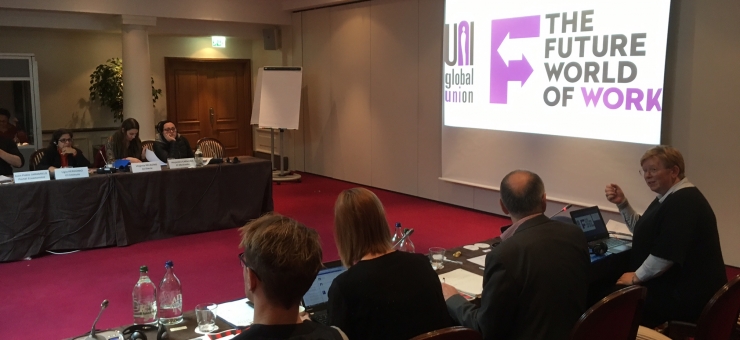Crying foul play over trade agreements

UNI Global Union’s trade expert, Christina Colclough, briefed a group of Latin America journalists during a week- long seminar held jointly by the World Trade Organisation and Friedrich Ebert Stiftung (FES) in Geneva.
Dr Colclough, who is UNI’s Director of Platform & Agency Workers, Digitalisation and Trade, began by illustrating how far the tentacles of TiSA (Trade in Services Agreement) would stretch if it came into effect.
She said, “TiSA may be shelved for the time being but we should take its threat seriously. The agreement would cover a lot more than you would expect. A pair of trainers with a chip recording health information such as number of steps, heart rate et cetera would be considered a service. Under TiSA the service would be free from regulation. Even services that don’t yet exist would be covered for eternity and that is a threat to our democracy.”
Taking this threat seriously, Dr Colclough said that UNI Global Union are gathering intelligence through its sectors. UNI in collaboration with FES recently launched a report TiSA: Foul Play, pulls no punches in its assessment:
The report explains that the United States, European Union, and a powerful corporate lobby are behind the secretive TiSA negotiations which involve 50 countries.
Dr Colclough said, “E-commerce is the new ‘trade highway’ of the 21st century, and is central to the agreement. TiSA focuses on boosting e-commerce at any cost. The pact would seriously redistribute power from the public sphere of national politics to the private, undemocratic realm controlled by a handful of mega-corporations, namely the so-called BIG TECH: Facebook, Amazon, Apple, Microsoft and Google.
“What’s clear is that TiSA would be bad for workers, unions, and consumers. Corporate demands would eclipse communities’ needs and inequality within and between countries would deepen ever further. Unions would be under attack and governments would not be able to enact new protections in the public’s interest.
“The bottom line is that TiSA restricts signatory nations’ right to regulate, even when emerging services and technologies pose unforeseen risks.”
Digging deeper, Dr Colclough said TisA would side-step ‘localization demands’ – the need for the company to have a presence in the country where the services are being provided. Localization protects customers because they can resort to national law but not under the TiSA proposals.
“We are not arguing that we do not need global legislation on trade but we must put people and planet first and not hand over power to big international conglomerates. TiSA’s proposal on non-discrimination against foreign companies would skewer local markets in favour of multinational companies. For example, how can the local supplier of solar power panels compete on cost with an international company? Non-discrimination would mean the removal of preferential treatment, allowing multinationals to come in and take over the market – the local solar panel supplier or plumber doesn’t stand a chance, and with their fall many jobs will go too.”
One of the other deeply troubling effects of TiSA would be on privacy rights. Dr Colclough said, “The United States is arguing for the free flow of data where the country who hosts the server will own that data. Guess what – 90% of servers are based in the United States!”
Dr Colclough mentioned another salient point that goes the heart of the gross inequality TiSA would create: source codes. “Under the proposed legislation a company would be under no obligation to share its information, creating a wider digital divide between the haves and the have nots of the developing world,” she explained.
After putting TiSA into the context of global megatrends, namely, climate change, migration and record levels of inequality where eight men owned the combined wealth of 50% of the global population, Dr Colclough concluded by exploring one of the biggest drivers of change: Big Data.
“Big Tech, through their complex supply chains are estimated to own 90% of the data, and these companies are potentially breaking free of democracy which does not bode well for anyone except those making obscene profits.
“Free flow of data represents data imperialism. An international company may set up an e-health system in an African country for free but only in exchange for data, which is the real gold.”
Trade agreements were one of the topics of UNI’s recent Leadership Summit.

